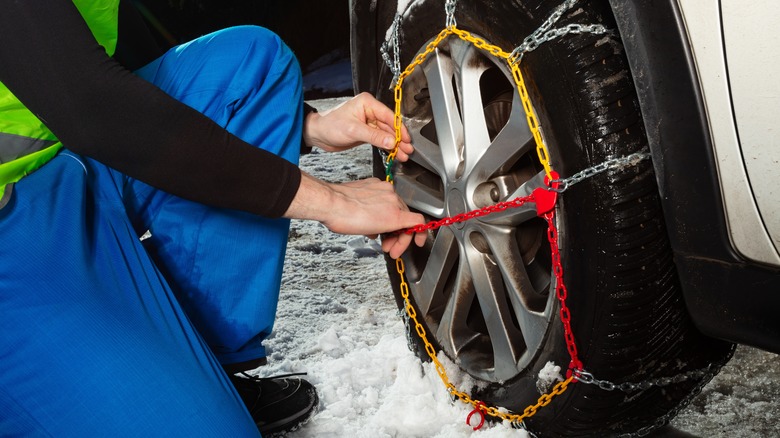Snow and ice might make for an idyllic winter wonderland scene, but on the road, they become a safety hazard for drivers. According to the Federal Highway Administration, nearly one in four weather-related accidents occurs when the roads are icy or covered in slush, and another 15% take place during snowstorms. These accidents are responsible for over 2,000 deaths and nearly 200,000 injuries each year.
There are several reasons why winter weather conditions are so dangerous to drive in, but one of the most common concerns is a loss of traction. Imagine walking along a snowy, icy path, where stepping in the wrong spot — or moving too quickly — could send you slipping and falling to the pavement. The same thing can happen to your car tires when they hit a slick spot, causing you to lose control of the vehicle and veer into another lane or even off the road.
Losing traction can be scary, even for experienced drivers, but one item might help you maintain better control over your vehicle: a bag of sand or kitty litter. Placing heavy bags in the trunk can help improve traction, especially for lightweight or rear-wheel drive cars, though almost any vehicle can benefit. For smaller cars, 300 to 400 pounds of sand or kitty litter is enough to help the tires grip the road better, while up to 500 pounds works well for vans and SUVs. For large trucks, 500 to 700 pounds is sufficient to reduce sliding.
The bags can also help if you get stuck in the snow

Heavy bags of sand and kitty litter can help your car gain traction by providing enough weight to help the tires sink into the road, but they can also come in handy if you find yourself stuck in a snow pile. Grab a shovel (another emergency item that you shouldn’t leave home without, especially when traveling in the snow) and clear the snow away from the tires. Then, sprinkle the sand or litter around and under the tires to create a rough surface. Try accelerating or rocking the vehicle again, applying more sand or litter as needed until you get unstuck.
Note that some types of sand and kitty litter are better than others for boosting traction. Traction sand is designed to improve grip and is generally safe for the environment, making it an ideal choice. Kitty litter, on the other hand, isn’t always environmentally friendly and often doesn’t provide the same friction as sand. If you must use litter, make sure the product is non-clumping, as other types may be slippery and can make matters worse once you’re caught in the snow.
Other ways to improve traction in a winter storm

If you’re planning a winter road trip or traveling to a snowy destination by car, there are a few other ways to prep your vehicle besides stocking up on sand and kitty litter. First, consider swapping your standard tires for winter tires, which offer additional traction on snowy and icy roads. If you’re not ready to invest in a whole new set of tires for one trip — especially if you live in a place where it rarely snows — consider investing in all-season tires that offer some grip in winter conditions while still being appropriate for other types of weather.
Tire socks and chains are other solutions that increase tire traction on slick roads. Tire socks are fabric coverings that go around the tires, allowing for extra grip. Note that socks are only meant to be used temporarily, and installation can take some work. Winter chains wrapped around the tires work similarly and are meant to be placed only on the wheels propelling the vehicle (for example, front-wheel drive cars should only have chains on the front tires). Keep in mind that chains are only meant for use on snowy roads and at low speeds. Driving fast or on uncovered pavement could damage the metal or even your tires underneath.

